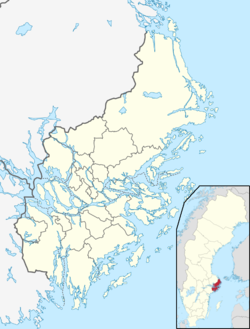Stockholm urban area
Stockholm urban area | |
|---|---|
| Coordinates: 59°20′N 18°04′E / 59.333°N 18.067°E | |
| Country | Sweden |
| Province | Södermanland and Uppland |
| County | Stockholm County |
| Municipality | |
| Area | |
| • Total | 381.63 km2 (147.35 sq mi) |
| Population (31 December 2019)[1] | |
| • Total | 1,593,426 |
| • Density | 4,175/km2 (10,810/sq mi) |
| Time zone | UTC+1 (CET) |
| • Summer (DST) | UTC+2 (CEST) |
The Stockholm urban area (Template:Lang-sv) is the largest and most populous of the statistical localities or urban areas in Sweden. It has no administrative function of its own, but constitutes a continuous built-up area, which extends into 11 municipalities in Stockholm County. It contains the municipal seats of 10 of those. As of 31 December 2019, the population in the Stockholm urban area was 1,593,426 inhabitants, the area 381.63 km2 (147.35 sq mi), and the population density 4,175 inhabitants/km2.[1] Stockholm urban area is not the same as Metropolitan Stockholm (Storstockholm), which is a much larger area.
In 2019, the population of the urban area and the municipalities into which it extends, broken down per municipality was the following:[2]
| Municipality | Population | ||||
|---|---|---|---|---|---|
| In Stockholm urban area |
In other urban areas |
Other | Total | % in Stockholm urban area | |
| Stockholm | 974,073 | 0 | 1831 | 975,904 | 100.0 |
| Huddinge | 110,252 | 1,448 | 771 | 112,848 | 97.7 |
| Järfälla | 79,830 | 0 | 160 | 79,990 | 99.8 |
| Solna | 82,429 | 0 | 0 | 82,429 | 100.0 |
| Sollentuna | 68,835 | 4,313 | 81 | 73,857 | 93.2 |
| Botkyrka | 62,156 | 26,191 | 2,137 | 94,606 | 65.7 |
| Haninge | 53,599 | 27,371 | 4,806 | 92,095 | 58.2 |
| Tyresö | 44,370 | 3,118 | 402 | 48,333 | 91.8 |
| Sundbyberg | 52,414 | 0 | 0 | 52,414 | 100.0 |
| Nacka | 38,394 | 56,085 | 1,112 | 105,189 | 36.5 |
| Danderyd | 27,074 | 5,477 | 23 | 32,857 | 82.4 |
| Total | 1,593,426 | 124,003 | 9,623 | 1,750,522 | 91.0 |
See also
- For administration and government see the respective municipalities in the list above
- Stockholm
- List of metropolitan areas in Sweden
References
- ^ a b c "Localities 2010, area, population and density in localities 2005 and 2010 and change in area and population". Statistics Sweden. 29 May 2012. Archived from the original on 16 January 2013.
- ^ http://www.scb.se/sv_/Hitta-statistik/Statistik-efter-amne/Miljo/Markanvandning/Tatorter-arealer-befolkning/#c_li_335300
Template:Localities in Stockholm Municipality Template:Localities in Sundbyberg Municipality


